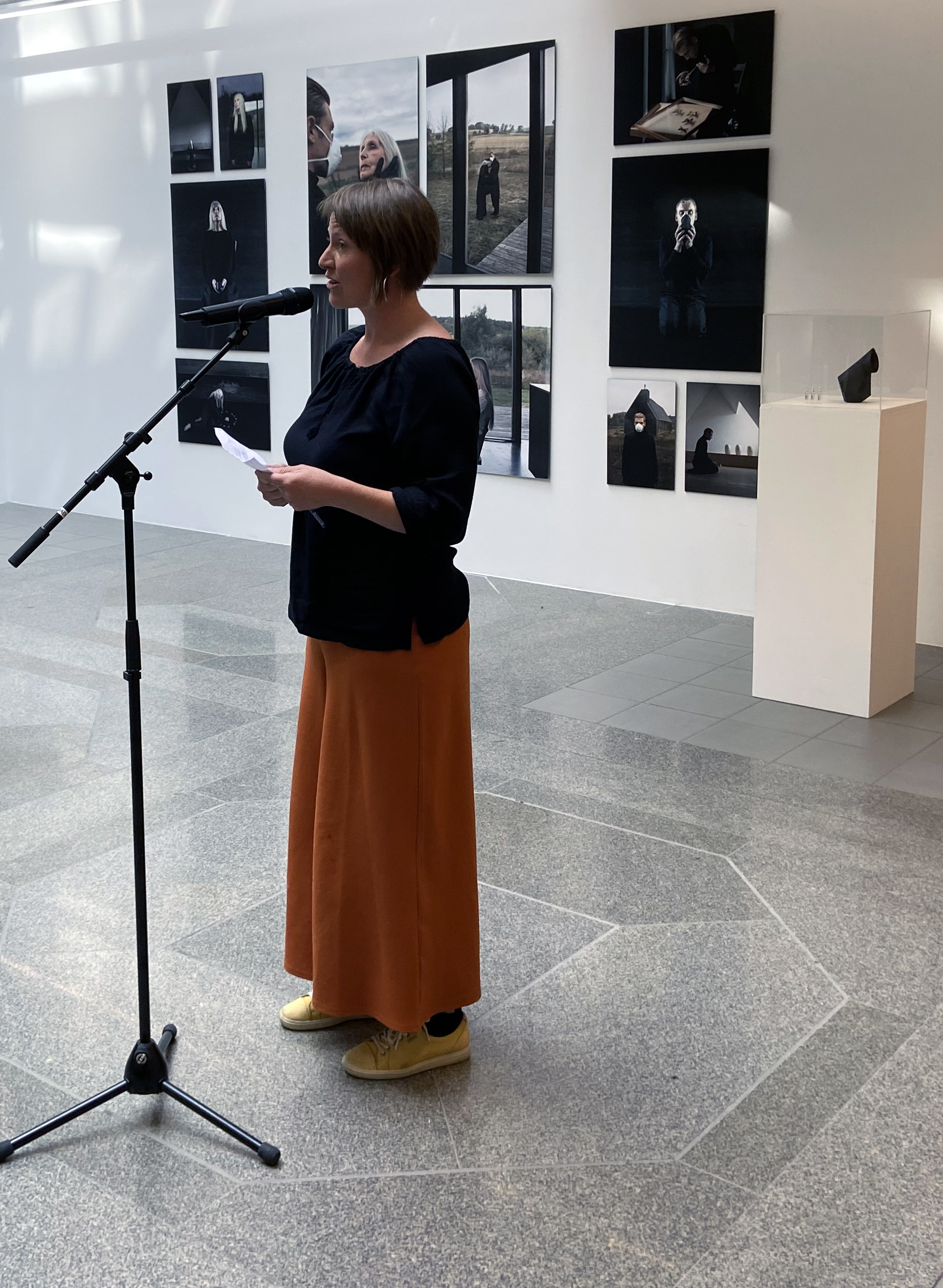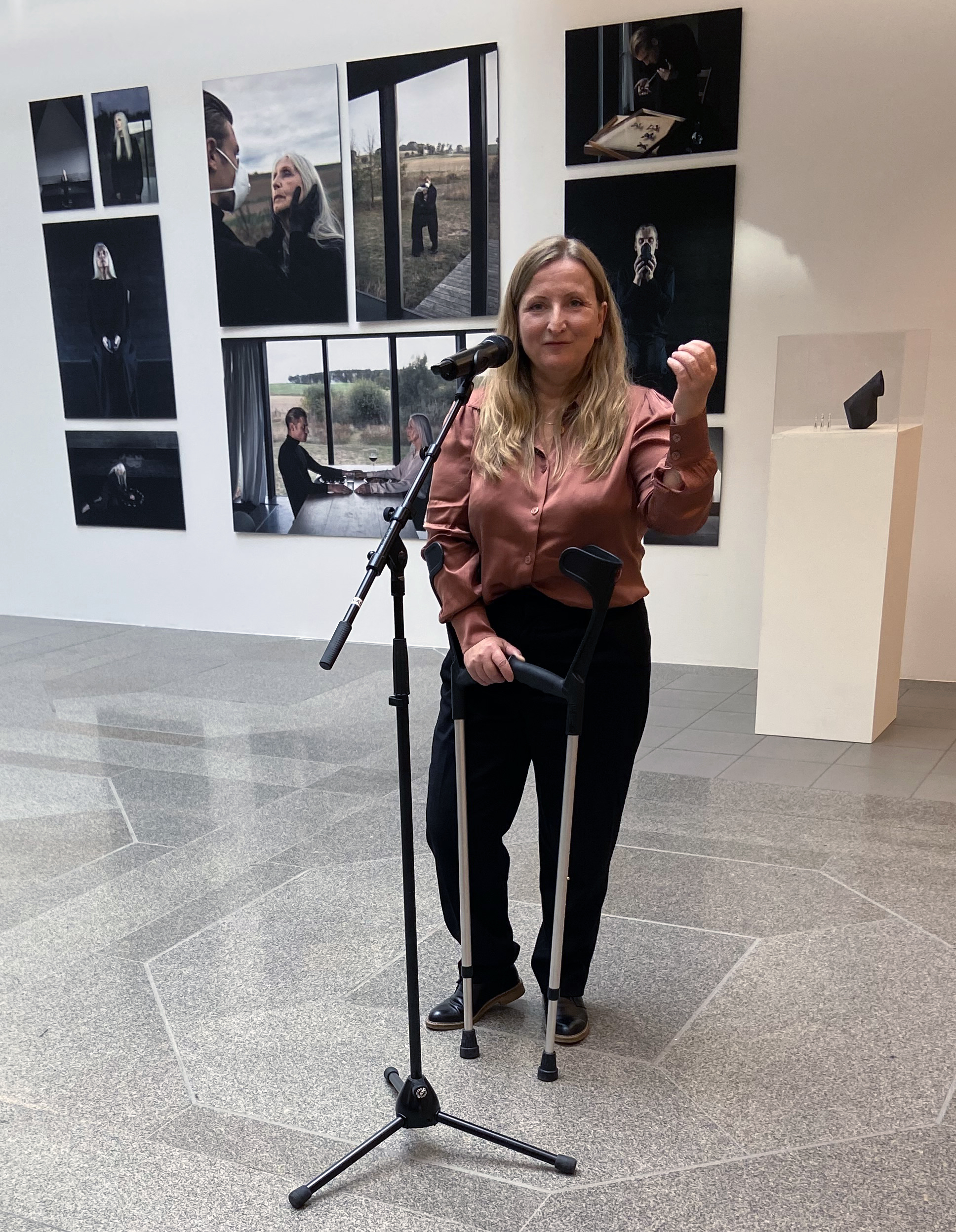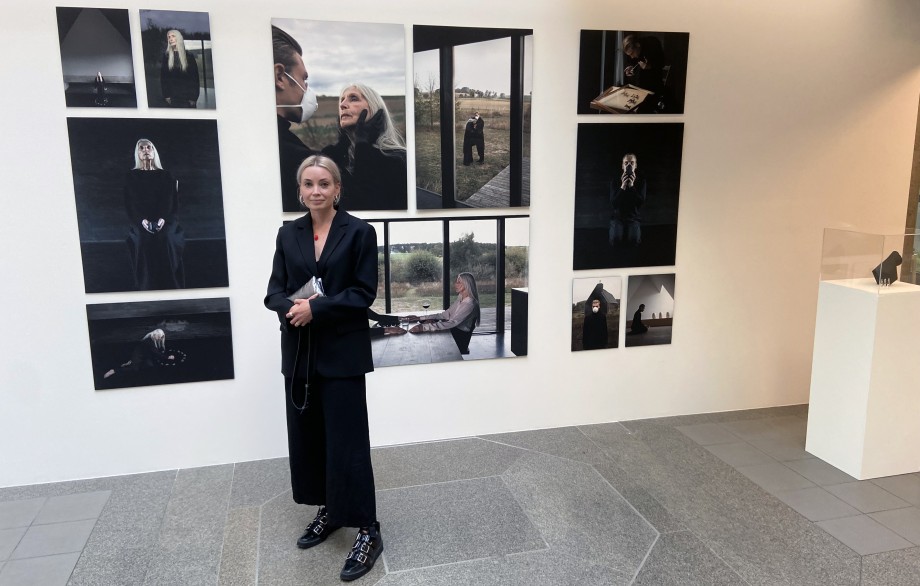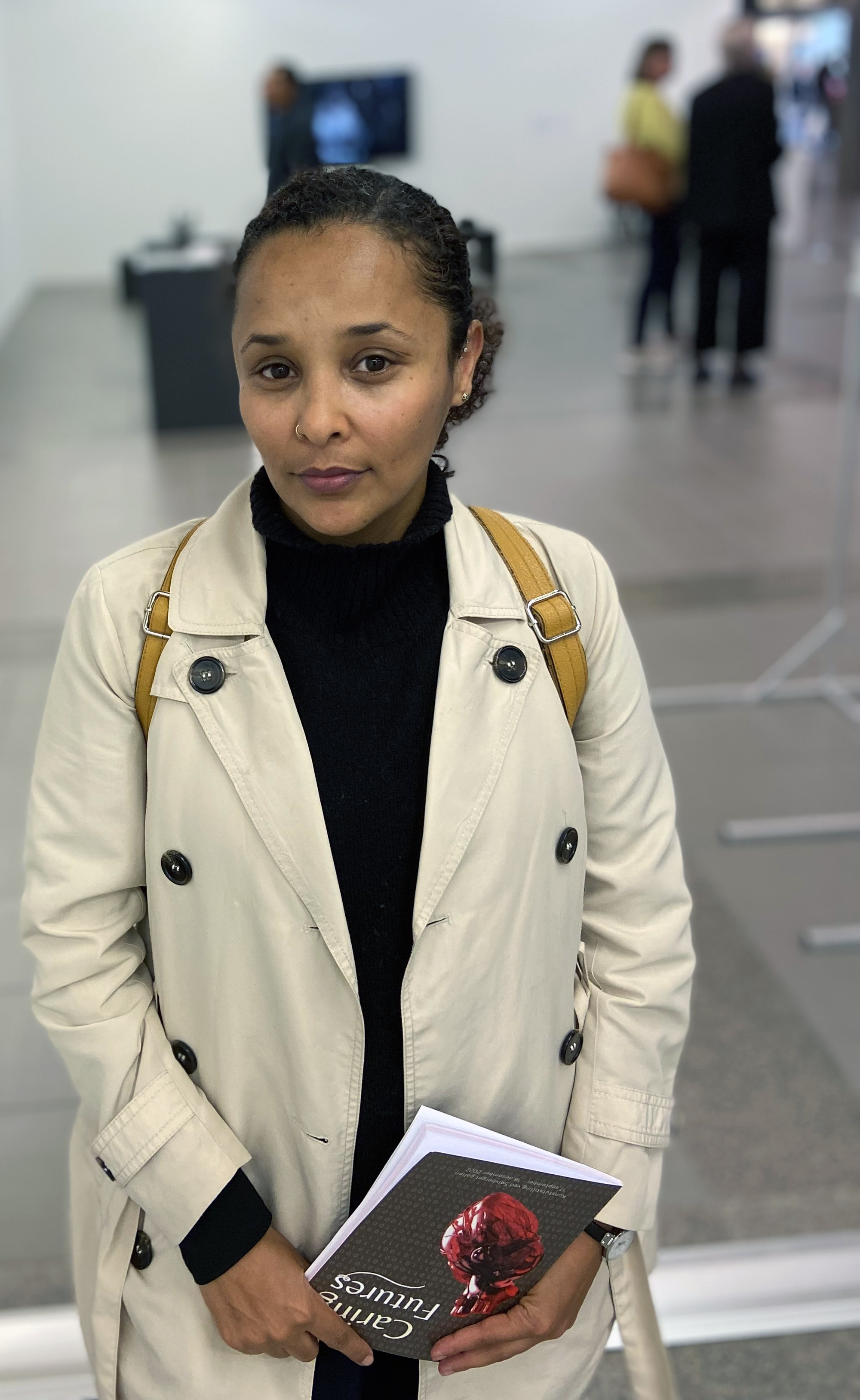After a long and close collaboration, Ingvil Hellstrand (UiS) and curator Hege Tapio were able to deliver their opening speeches to mark the opening of the art exhibition CARING FUTURES at Sølvberget Galleri.
The exhibition is part of the research project "Caring Futures: Developing Care Ethics for Technology-Mediated Care Practices" at the Department of Care and Ethics at the Faculty of Health Sciences. The project is funded by the Research Council of Norway (RCN) and deals with ethics of care in a time of transition for health, care and welfare policies, services and practice.
“This has been a wonderful process. All the hard work we have put in materializes as we open this exhibition. Collaborating with Hege on this exhibition has been very instructive”, says Ingvil Hellstrand, an Associate Professor and work package lead in the project.

Shining a spotlight on the relationship between technology and care
Hellstrand was instrumental in developing the idea of including an art exhibition in the research project. Today, she is particularly happy about that decision. The exhibition in the heart of the city communicates with a wider audience in society and with groups of researchers other than those working in academia. Though there is a lot of talk about ethics in the government's action plans, there is little detail about what ethics is in practice. This knowledge gap is a basic premise of the Caring Futures project
“We know too little about how technology in the field of care impacts our relationships, and we need more knowledge and more care ethical thinking around it. We hope our project puts this on the agenda”, says Hellstrand.
On being asked about key elements in the feedback from actors who are impacted by the use of technology in care, Hellstrand responded, “One key impression so far is that there needs to be a greater spotlight on what is at stake in these relationships. The actors are asking for more information and more space to reflect upon how use of technology in care is affecting their own practice”.

Using art to illuminate issues of social relevance
In her opening speech, curator Hege Tapio pointed out how the exhibition was an excellent opportunity to show precisely how artists use their artistic perspectives and professional expertise to examine the tensions between health and technology. In addition to her role as curator of the exhibition, Tapio is both an artist and a research fellow at the Department of Aesthetics at Oslo Metropolitan University.
“We published an "open call" in 2021 and we were preferably looking for artists from the Nordic countries. A total of 25 artists expressed their interest, but only seven of these made the final selection. We also invited an artist on our own initiative” says Tapio.
She believes that the exhibition engages the wider public by addressing questions with societal relevance. This is also strengthened by the fact that everyone can relate to getting old and sick and needing care in vulnerable times.
On a wall outside the art exhibition, departing visitors are encouraged to formulate thoughts, reflections and questions on post it notes. These are then hung on the wall to be used as data in further research.
- I think it's absolutely fantastic that the public gets the opportunity to contribute in this way. The forms of speculative and critical design that I create are intended to be engaging and to make people ask questions. It is quite rare that you have this possibility in connection with an art exhibition, says Emilia Tikka, one of the artists at the art exhibition.
Poetic and speculative philosophical scenarios
Tikka’s work "ÆON - TRAJECTORIES OF LONGEVITY AND CRISPR" has eleven photographs and is a speculative narrative about a couple in the near future who have made opposite decisions about using anti-aging technology. When they were both 30 years old, the man decided he wanted to stop the aging process, while the woman wanted to continue her natural development. The photographic narrative takes place 60 years after this fact. Understandably, man looks drastically younger than the woman in the photos.

“I want to ask questions about technologies that are about to arrive, but that aren’t quite there yet. There is still room to discuss whether this will be a desirable development for society” says Tikka.
This is her first exhibition in Norway. She is keen to exhibit more in Norway in the future but is open about several customs-related challenges she faced in connection with bringing her art to Stavanger. Two weeks before the opening, she sent the work to Norway, but after two weeks in Belgium it was sent back.
“In Stavanger too, it was held in customs for a few days. Finally, the day before the opening we finally succeeded in transporting the art to Sølvberget Galleri,” says the artist, who is also currently a PhD candidate at the Aalto University, School of Arts, Design and Architecture in Helsinki , Finland.

Encourages fellow students to visit the exhibition
Miriam Sbhatu was one of the students from the Faculty of Health Sciences who found her way to the opening in Sølvberget Galleri. As a master student in Health Sciences, she found the exhibition both interesting and insightful. Sbhatu acknowledged that technology could be very helpful in various areas in the health sector but also pointed out the importance of critical reflection prior to implementation.
When asked why she would encourage other students to visit the exhibition, she responded “A visual presentation opens the door to greater emotional engagement than reading an article. Looking at these works of art kickstarts my own personal reflections. Care is created by sensory impressions. For me to care about you, I must tap into your humanity”.
A happy HoD
Kristin Kavli Adriansen, Head of Department at the Department for Care and Ethics, was also present during the opening. Adriansen was very happy with the use of a key city space for the exhibition. She also expressed her delight that both the art and research ideas of Caring Futures were being communicated outside university and academic circles.
“It is incredibly exciting to have an art exhibition that visually highlights all the issues that arise in the intersection of welfare technology, ethics, values and views of humanity” says Adriansen.
Text and photo: Eigil Kloster Osmundsen
News from the Faculty of Health Sciences
Global State of Patient Safety 2023 – Supporting Leaders
At a time when healthcare is at a crossroads, the "Global State of Patient Safety 2023 – Supporting Leaders" seminar hos...
Oslo University Hospital is a new partner in SHARE
As a new partner, Section for Acute and Pre-hospital care at Oslo University Hospital strengthens research on prehospita...
Together for a Sustainable Future of Quality and Safety
SHARE - Center for Resilience in Healthcare recently hosted an international seminar titled “The future of quality and s...
Gathering International Researchers at Sola
SHARE – Center for Resilience in Healthcare at UiS is hosting Resilient Health Care Society’s summer conference at Sola ...
Organizes seminar on the future of quality and safety in healthcare
SHARE – Center for Resilience in Healthcare is hosting an international seminar titled “The future of quality and safety...
Prestigious EU grant for Health Services Research
Researchers at the University of Stavanger have received 6 million euros from the prestigious EU research program Horizo...
Ingvil Hellstrand Wins Award for Dissemination and Societal engagement
The UiS researcher moves elegantly between equal opportunities and gender diversity, welfare and caring sciences researc...
Signe Østrem Furre is the newest member of eHealth@H2H research team
She joins the existing team of nurses who have developed and are testing the nurse assisted digital application that aim...
Reducing nurses’ workload with exoskeletons
Students and researchers at UiS are convinced that exoskeletons can be a useful aid for operating room nurses during lon...
A Care Strategy for caregivers and care receivers by the EU
During the conference “From Knowledge to Action – the role of carers is changing?” in Oslo on March 16 Stecy Yghemonos h...
Simulating the future
The Faculty of Health Sciences at UiS organized the course “Simulation-based learning in nursing education” from April 1...
Patients and families engaged in resilient healthcare systems
Patients and their families contribute to the resilience of healthcare systems. This is particularly evident as global h...
Two worlds colliding: exploring the boundaries between system resilience and individual resilience
A recent webinar organised by the Resilient Health Care Network focused on the intersection of individual psychological ...
Communication training at HelseCampus
Paramedical students in their third year of study and nurses from the municipal health service participated in a joint t...
The Caring Futures project on TV2 News
Researchers from “Caring Futures: Developing Care Ethics for Technology-Mediated Care Practices” were interviewed and qu...
Bringing together stakeholders in care technology
In the end of September, Health Campus Stavanger, in collaboration with the Caring Futures research project invited rese...
Calls for more international research collaboration
Professor Stephen Billett from Griffith University Australia, is involved in several of SHARE – Centre for Resilience in...
Discussing the relationality between people and technology
This is a theme of interest to both the author Cathrine Knudsen and the artist Kari Telstad Sundet. The event, Science F...
Award winner visited the Faculty of Health Sciences
Rosalynn Austin from the University of Southampton visited the Department of Public Health to discuss health promotion f...


















